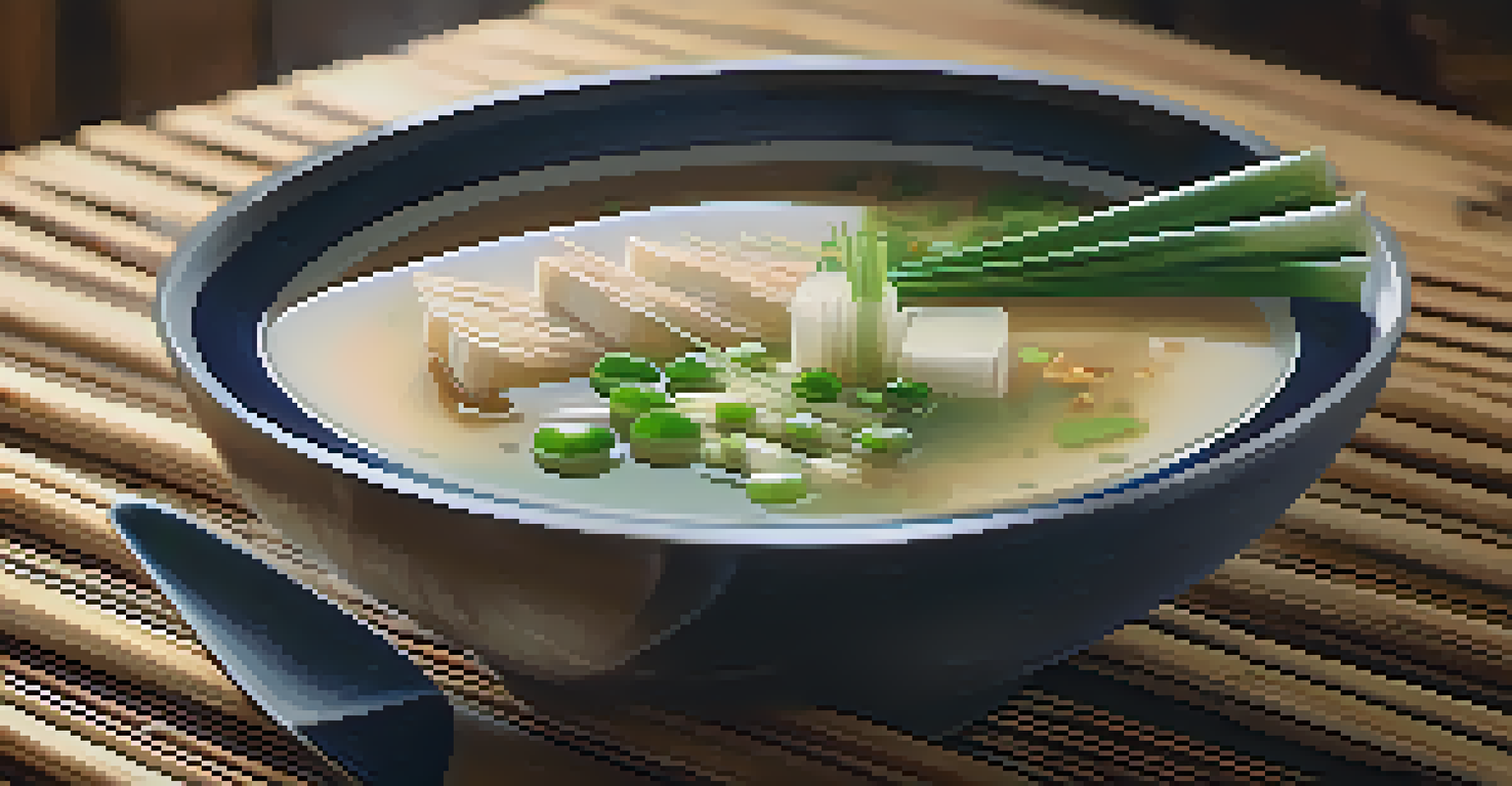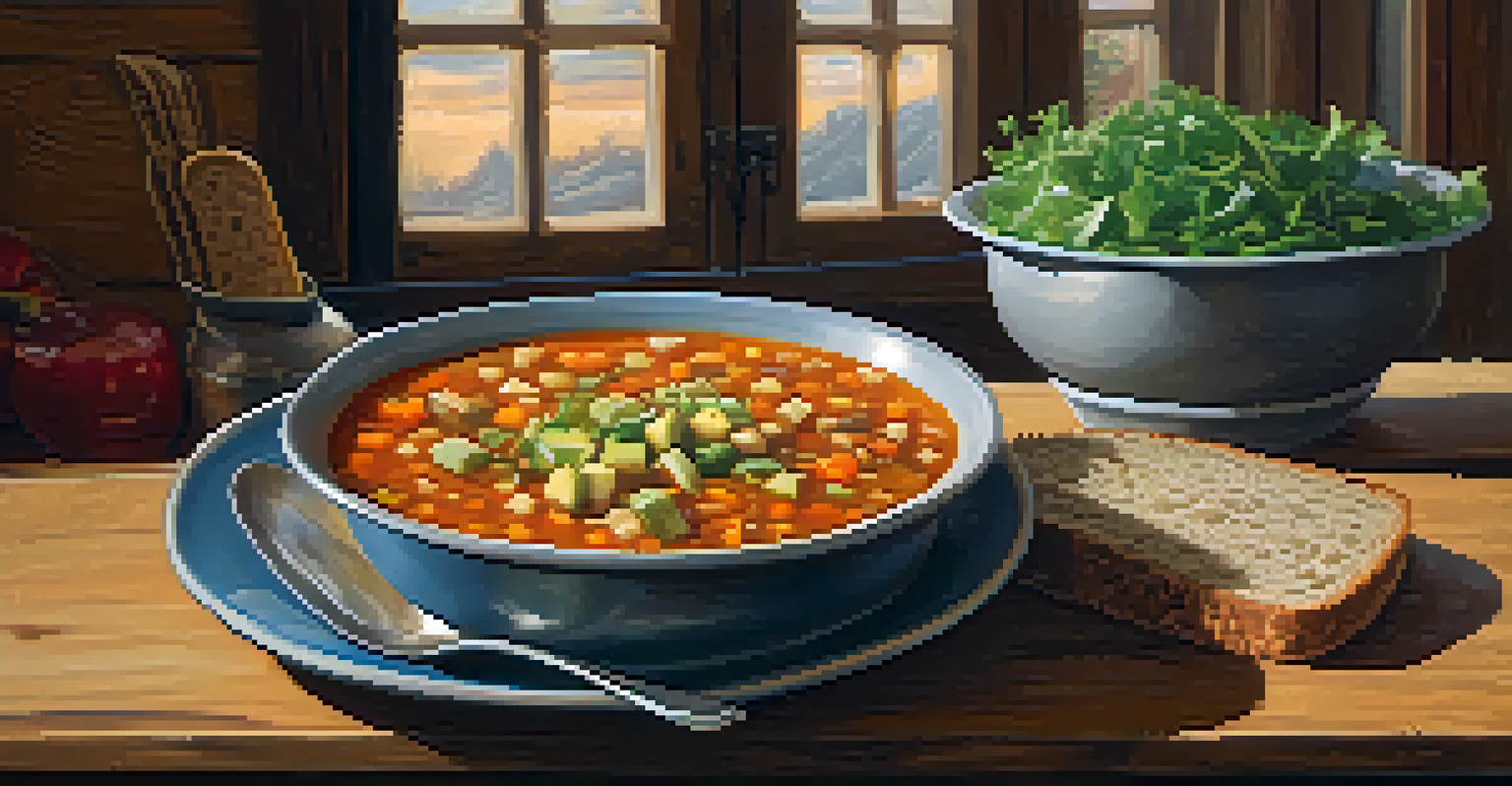Prebiotics in Vegan Foods: Fueling a Healthy Gut

What Are Prebiotics and Why They Matter
Prebiotics are non-digestible fibers that nourish the good bacteria in your gut. Unlike probiotics, which are live bacteria found in foods like yogurt, prebiotics serve as food for these beneficial microbes. This distinction is crucial because a healthy gut microbiome can significantly impact overall health.
Let food be thy medicine and medicine be thy food.
Think of prebiotics as the fertilizer for your gut garden, helping to cultivate a thriving community of bacteria. When you consume prebiotics, you're essentially feeding these bacteria, allowing them to flourish and perform their vital functions. This can lead to improved digestion, enhanced immunity, and even better mood regulation.
Incorporating prebiotics into your diet is especially important for those following a vegan lifestyle. Since plant-based diets can sometimes lack certain essential nutrients, prebiotics offer a natural way to support gut health while enjoying a variety of delicious vegan foods.
Top Vegan Foods Rich in Prebiotics
Several vegan foods are excellent sources of prebiotics. Foods like garlic, onions, leeks, and asparagus are rich in inulin, a type of prebiotic fiber that promotes the growth of beneficial gut bacteria. Including these in your meals can have a significant positive impact on your digestive health.

In addition to these alliums, bananas and oats also come packed with prebiotic benefits. Bananas contain resistant starch, which acts like a prebiotic; meanwhile, oats are loaded with beta-glucan, a soluble fiber that helps maintain a healthy gut microbiome. These foods are not only nutritious but also versatile, making them easy to add to various dishes.
Prebiotics Nourish Gut Bacteria
Prebiotics serve as essential food for beneficial gut bacteria, promoting a healthy microbiome and improving overall health.
For a delightful twist, consider snacking on chicory root or enjoying a cup of miso soup, which also contains prebiotics. By diversifying your diet with these vegan options, you can easily enhance your gut health while savoring the flavors of plant-based cuisine.
How Prebiotics Support Gut Health
Prebiotics play a vital role in maintaining a balanced gut microbiome. They help increase the population of beneficial bacteria, which can outcompete harmful bacteria for resources. This balance is crucial for preventing digestive issues and promoting overall health.
The gut is a second brain, and it acts independently of the brain in your head.
Moreover, prebiotics can enhance the absorption of minerals, particularly calcium and magnesium. With a well-functioning digestive system, your body can maximize the nutrients it takes in from your vegan diet, ensuring you get the most out of your meals. This is particularly beneficial for those who may have dietary restrictions.
Additionally, a healthy gut impacts more than just digestion; it can influence your mood and immune system. By nourishing the good bacteria with prebiotics, you're supporting not only your gut health but also your overall well-being—making it a win-win situation.
The Synergy Between Prebiotics and Probiotics
Understanding the relationship between prebiotics and probiotics is essential for gut health. While prebiotics feed the beneficial bacteria, probiotics add more of these live microorganisms to your gut. Together, they work synergistically to create a balanced and thriving microbiome.
Imagine a team where prebiotics are the supporters and probiotics are the players on the field. Without the supporters, the players can't perform at their best. By consuming both prebiotics and probiotics, you create a harmonious environment that fosters gut health and overall wellness.
Vegan Foods Rich in Prebiotics
Incorporating vegan foods like garlic, bananas, and oats can significantly enhance your intake of prebiotics and support gut health.
Vegan foods like fermented products—think kimchi, sauerkraut, and plant-based yogurts—can provide the probiotics your gut needs. Pairing these with prebiotic-rich foods creates a powerful combination that can lead to improved digestion and enhanced health benefits.
Incorporating Prebiotics into Your Vegan Diet
Adding prebiotics to your vegan diet is easier than you might think. Start by including a variety of prebiotic-rich foods in your meals. For instance, toss some chopped garlic into your stir-fry or enjoy a banana as a snack. Small changes can make a significant difference.
Meal planning can also help ensure you're getting enough prebiotics. Consider preparing dishes that highlight these foods, such as a hearty vegetable soup with leeks or a smoothie with oats and bananas. This not only boosts your nutrient intake but also keeps your meals exciting and flavorful.
Don't forget to listen to your body as you introduce more prebiotics into your diet. Some people may experience mild digestive discomfort when increasing fiber intake, so start slowly and gradually increase your consumption. Your gut will thank you!
Potential Challenges and Considerations
While prebiotics offer numerous benefits, some individuals may face challenges when consuming them. For people with certain digestive disorders, like irritable bowel syndrome (IBS), high-fiber foods can sometimes cause bloating or discomfort. It's important to be mindful and consult a healthcare professional if you have concerns.
Additionally, not all prebiotic foods are created equal. Some processed vegan foods may claim to be high in fiber but lack the necessary prebiotic properties. Always read labels and choose whole, minimally processed foods to ensure you're getting the most health benefits.
Synergy of Prebiotics and Probiotics
Combining prebiotics with probiotics creates a balanced gut environment, leading to improved digestion and overall wellness.
Lastly, remember that balance is key. A diet focused solely on prebiotic-rich foods might not provide all the nutrients your body needs. Strive for a diverse diet that includes a wide range of fruits, vegetables, whole grains, and legumes for optimal health.
The Future of Prebiotics in Vegan Nutrition
As interest in gut health continues to rise, the role of prebiotics in vegan nutrition is garnering more attention. Researchers are exploring new sources of prebiotics and how they can be integrated into plant-based diets. This could lead to innovative vegan products designed to support gut health.
The growing vegan movement also encourages more people to focus on whole foods that are naturally rich in prebiotics. This shift can promote a healthier population, as individuals become more aware of the benefits of a balanced gut microbiome. By prioritizing gut health, we can enhance our overall well-being.

In the coming years, we may see an increase in vegan foods fortified with prebiotics, making it even easier to nourish our guts. Embracing this knowledge and being proactive about gut health can lead to a healthier lifestyle for everyone, vegan or not.